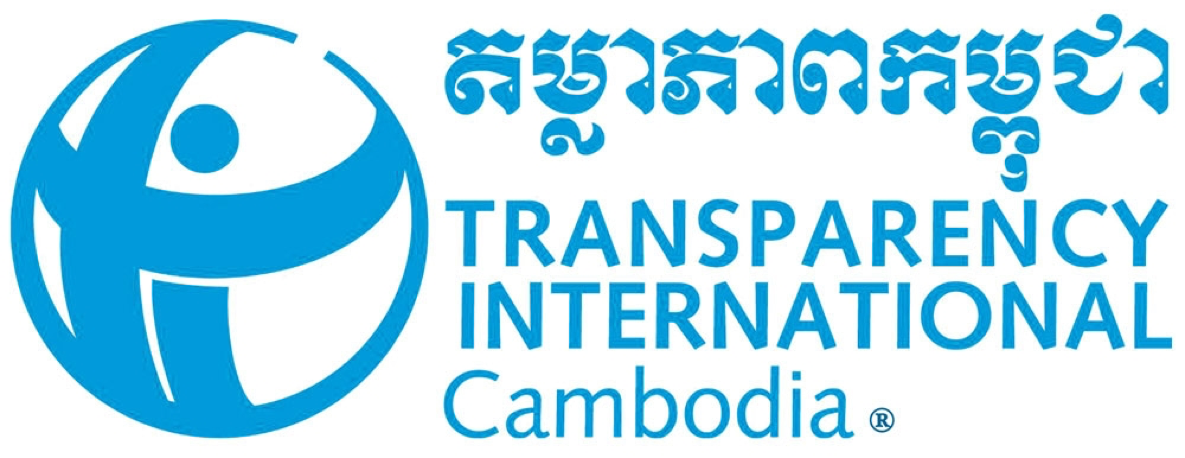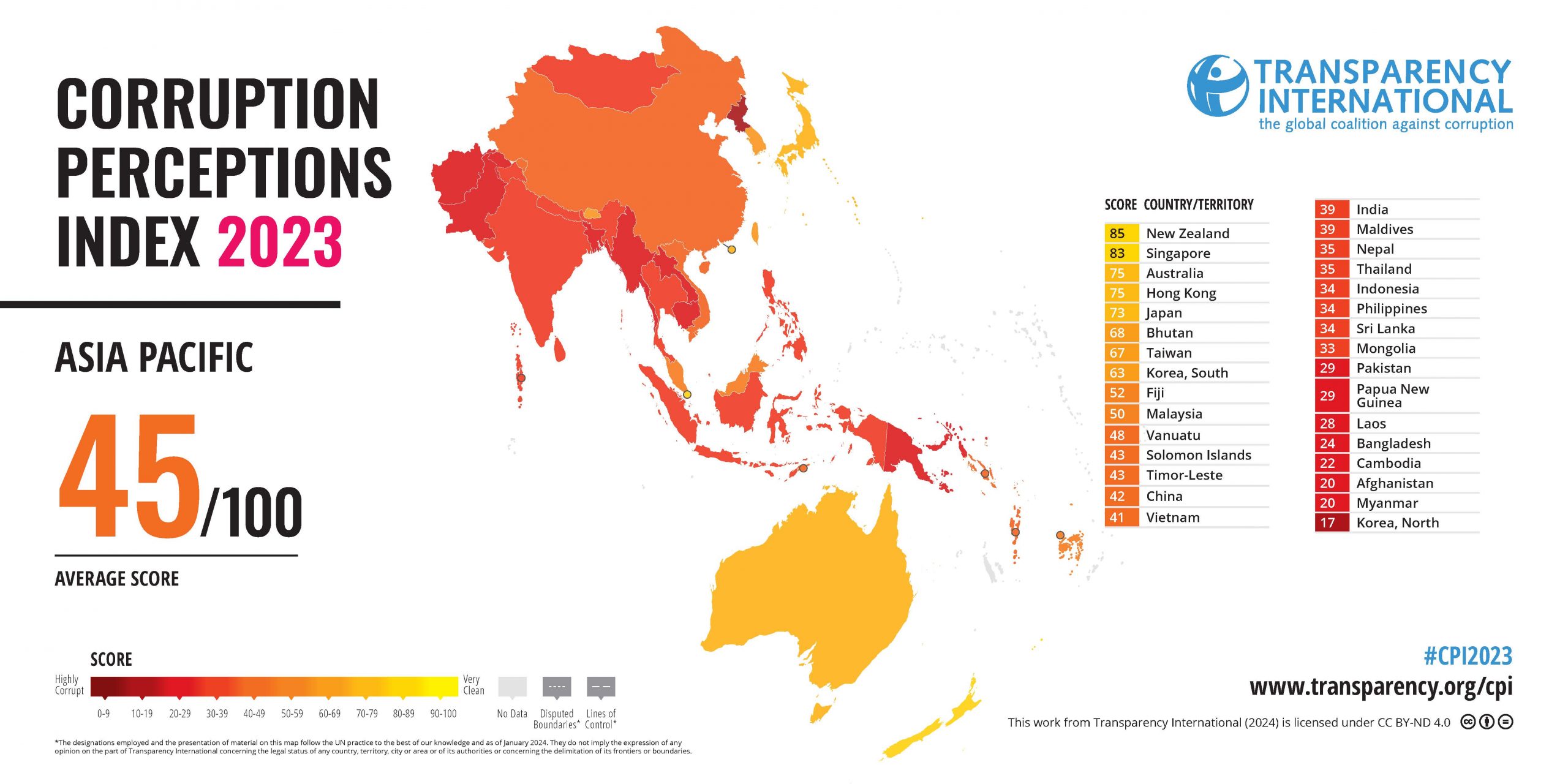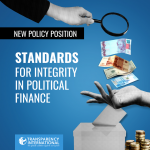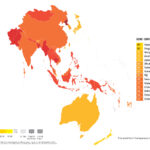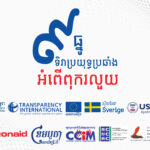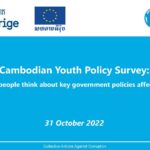CPI 2023 Press Release Cambodia
Phnom Penh, 30 January 2024
The 2023 Corruption Perceptions Index (CPI) released today by Transparency International reveals Cambodia’s score has received a score of 22 out of a possible 100, representing a two-point decrease compared to 2022. This places Cambodia at 158th position out of 180 countries assessed, down from 150th last year. The result marks a concerning trend, as Cambodia’s CPI score has fluctuated within the low 20s for the past decade, despite sporadic improvements.
The CPI ranks 180 countries and territories by their perceived levels of public sector corruption on a scale of zero (highly corrupt) to 100 (very clean). Cambodia’s 2023 CPI score remains far lower than the regional and global averages. Within ASEAN, Cambodia remains near the bottom, surpassing only Myanmar (20) in the ranking. Across the broader Asia Pacific region, Cambodia occupies the fourth-lowest position, ahead of only Afghanistan (20), Myanmar (20), and North Korea (17). Performance among other ASEAN nations varied. Scores dipped for Vietnam (from 42 to 41), Thailand (36 to 35), Laos (31 to 28) and Myanmar (23 to 20). Conversely, Malaysia (47 to 50) and the Philippines (33 to 34) saw positive score movements. Singapore (83) and Indonesia (34) maintained their scores.
Transparency International Cambodia’s in-depth analysis of the seven key data sources behind Cambodia’s 2023 Corruption Perceptions Index (CPI) reveals a lack of progress in the fight against corruption during the past year. The data paints a concerning picture of persistent challenges, including ineffective prosecution of corrupt officials, widespread resource misuse, and weak accountability mechanisms. The data sources also highlight the continued high risk of bribery and corrupt practices in everyday business transactions, a dysfunctional judiciary, and the pervasive influence of narrow vested interests.
“This decline in score is a sign that Cambodia’s fight against corruption is stagnating. It is also a stark reminder of the pervasive corruption challenges Cambodia continues to face across various sectors,” said Pech Pisey, Executive Director of Transparency International Cambodia. “While there have been instances of progress in areas such as resource mobilization and local services, the expert opinions behind the CPI clearly point to the persistence of grand and political corruption, where crucial reforms aimed at strengthening the rule of law and justice have stalled.”
Globally, the 2023 Corruption Perceptions Index (CPI) shows that most countries have made little to no progress in tackling public sector corruption. The CPI global average remains unchanged at 43 for the twelfth year in a row, with more than two-thirds of countries scoring below 50. This indicates serious corruption problems.
According to the Rule of Law Index, the world is experiencing a decline in the functioning of justice systems. Countries with the lowest scores in this index are also scoring very low on the CPI, highlighting a clear connection between access to justice and corruption. Both authoritarian regimes and democratic leaders undermining justice contribute to increasing impunity for corruption and, in some cases, even encourage it by removing consequences for wrongdoers. The impact of their actions is evident in countries everywhere, from Venezuela (13) to Tajikistan (20).
François Valérian, Chair of Transparency International, said: “Corruption will continue to thrive until justice systems can punish wrongdoing and keep governments in check. When justice is bought or politically interfered with, it is the people who suffer. Leaders should fully invest in and guarantee the independence of institutions that uphold the law and tackle corruption. It is time to end impunity for corruption.”
TI Cambodia reiterates its urgent call to the government to amplify and expedite its reform efforts in eradicating corruption. This demands concrete steps across several crucial areas:
- Punish All Corruption: Swiftly prosecute all corrupt acts, petty or grand, with effective laws and strong enforcement. Make corruption risky and unrewarding.
- Empower Accountability and Oversight: A culture of accountability requires the protection and promotion of democratic freedoms, including freedom of expression, association, and assembly. Guaranteeing justice for human rights defenders and fostering their critical role in oversight is paramount. Public oversight bodies like anti-corruption agencies and audit institutions must be empowered with adequate resources and independence to investigate and punish wrongdoing. An independent judiciary, free from political influence, is vital for effectively checking executive power. Finally, transparent and fair elections are crucial for ensuring that citizens have a voice in shaping their future.
- Modernize Anti-Corruption Legal Frameworks: Update anti-corruption laws to meet international standards. Pass whistleblower protection laws and a code of conduct for officials.
- Promote Transparency and Public Scrutiny: Guarantee the right to information through a robust Access to Information law. Foster transparency in government practices and resource allocation.
- Level the Playing Field for Businesses: Promote corporate transparency and fair competition. Eliminate bias in public procurement and ensure equal compliance for all businesses.
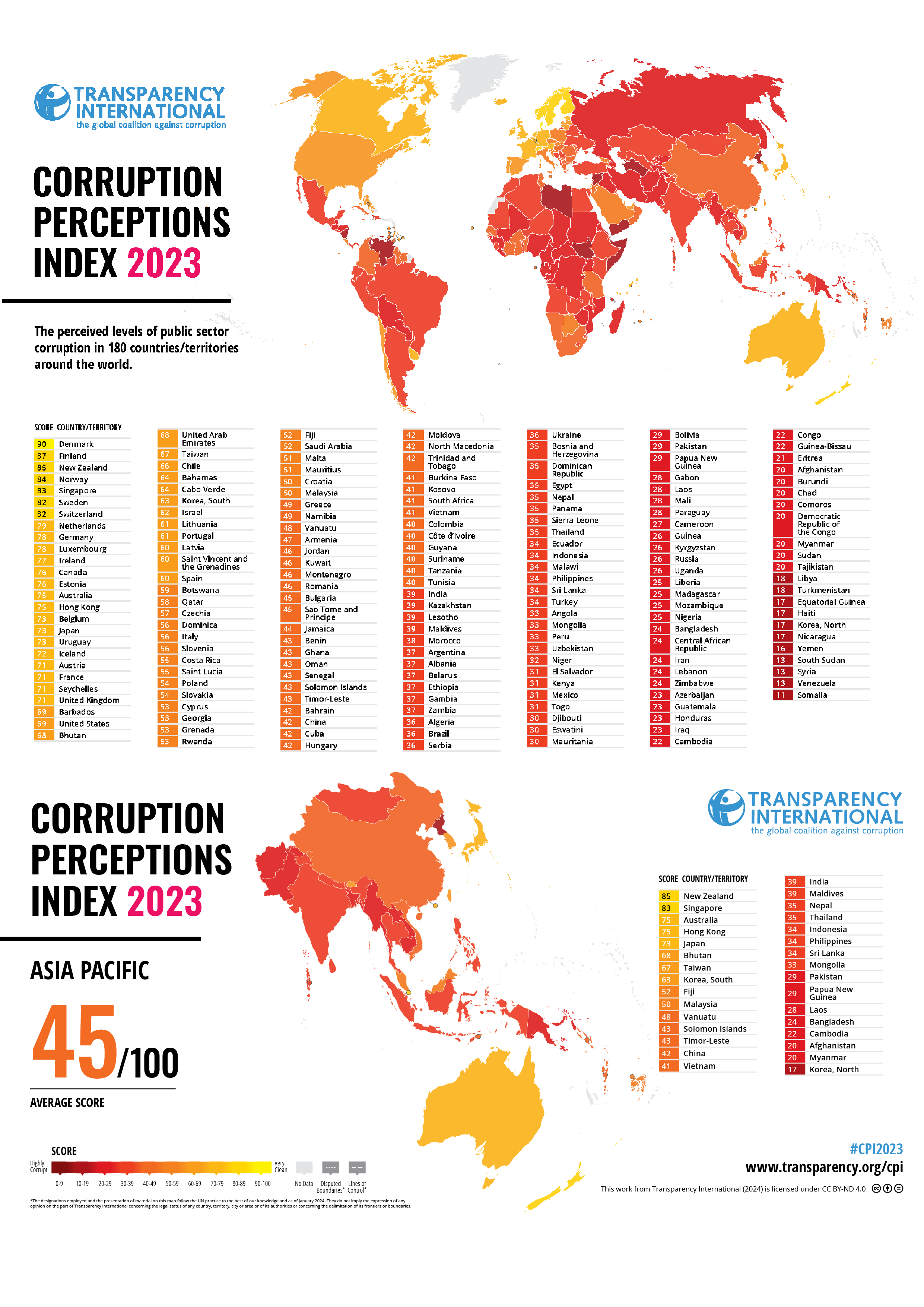
ABOUT THE CORRUPTION PERCEPTIONS INDEX
Since its inception in 1995, the Corruption Perceptions Index has become the leading global indicator of public sector corruption. The index scores 180 countries and territories around the world based on perceptions of public sector corruption, using data from 13 external sources, including the World Bank, World Economic Forum, private risk and consulting companies, think tanks and others. The scores reflect the views of experts and business people, not the public.
The process for calculating the CPI is regularly reviewed to make sure it is as robust and coherent as possible, most recently by the European Commission’s Joint Research Centre in 2017. The CPI scores from 2012 onwards can be reliably compared year by year. For more information, see this article: The ABCs of the CPI: How the Corruption Perceptions Index is calculated.
For further enquiries, please contact:
- Pech Pisey
Executive Director
Transparency International Cambodia
Signal: +855 89 972 620
- Im Norin
Director of Programs
Transparency International Cambodia
Signal: +855 12 713 330
Download Presentation on Cambodia’s Score
Download Short Methodology Note
Download Technical Methodology
Please watch Methodology video below:
This post is also available in: Khmer
 English
English ភាសាខ្មែរ
ភាសាខ្មែរ